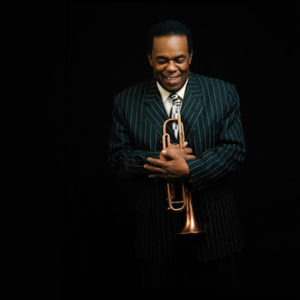
Freddie Hubbard
*Freddie Hubbard was born on this date in 1938. He was a Black jazz musician.
From Indianapolis, IN. He started playing the mellophone and trumpet in his school band at Arsenal Technical High School in Indianapolis, Indiana. Trumpeter Lee Katzman, former sideman with Stan Kenton, recommended that he begin studying at the Arthur Jordan Conservatory of Music (now the Jordan College of the Arts at Butler University) with Max Woodbury, the principal trumpeter of the Indianapolis Symphony Orchestra.
Hubbard's earliest professional work was with guitarist Wes Montgomery and his brothers. He moved to New York in 1958, playing with Eric Dolphy, Sonny Rollins, Quincy Jones, and others. He recorded with John Coltrane, Ornette Coleman, and Oliver Nelson's Blues On The Abstract Truth album. In 1961, Hubbard joined Art Blakey's Jazz Messengers for three years and recorded as a leader for Blue Note. His albums for the label include Breaking Point, Goin' Up, and Hub-Tones, and he appeared as a sideman on several important Blue Note dates, including Herbie Hancock's Maiden Voyage and Empyrean Isles.
After stints with Atlantic and Impulse! Records, Hubbard worked with producer Creed Taylor in 1970 and recorded several accessible and noteworthy jazz-fusion classics, including Red Clay, Straight Life, Sky Dive, and First Light. In the mid-'70s, Hubbard signed with Columbia, recorded, and toured with VSOP: a Miles Davis reunion combo featuring Herbie Hancock, Ron Carter, Wayne Shorter, and Tony Williams. Hubbard also collaborated with vocalists Chaka Khan and Elton John and recorded Double Take with trumpeter Woody Shaw.
He recorded on the Atlantic, Pablo, and EMI labels throughout the '80s. From the mid-'60s to the late '80s, Freddie Hubbard was arguably jazz's most influential and prolific trumpeter. Blessed with a sound that combined Clifford Brown's technique, Lee Morgan's bravura, and Miles Davis' sensitivity, Hubbard has been prominent for much of his career as both a leader and a sideman. Hubbards’ CD Above and Beyond was released in 1982.
Although health problems curtailed his output, his legacy as a trumpet king is assured. As the ‘80s got underway, Hubbard again led his group, playing at concerts and festivals in the U.S. and Europe. He frequently collaborated with Joe Henderson, playing a repertory of hard-bop and modal-jazz pieces. Other associations throughout the decade included Monterey Jazz Festival dates with Bobby Hutcherson, studio projects with Woody Shaw and Benny Golson, and a live recording in Holland (Feel the Wind) with Blakey in 1988. In 1990, he appeared in Japan in an American-Japanese concert package featuring Elvin Jones, Sonny Fortune, George Duke, Benny Green, Ron Carter, and Rufus Reid. He also performed at the Warsaw Jazz Festival – a date that was recorded and released in 1992.
Other pursuits in the early ‘90s included forming a new band of emerging young artists: Christian McBride, Javon Jackson, Carl Allen, and Benny Green. As the decade unfolded, he continued seeking fresh young talent by collaborating with the New Jazz Composers Octet. For the last decade of his career, Hubbard performed and recorded with the Octet, a collective led by fellow trumpeter David Weiss. His final recording, On The Real Side, was released in 2008.
Despite failing health, as the new century got underway, Hubbard continued to carry the jazz torch by participating in clinics and residencies at colleges nationwide to share his knowledge with up-and-coming artists. In 2006, the National Endowment for the Arts granted Hubbard its highest honor in jazz, the NEA Jazz Masters Award. He suffered a heart attack in late November 2008 in Sherman Oaks, California, and died a few weeks later, on December 29, 2008, at 70.